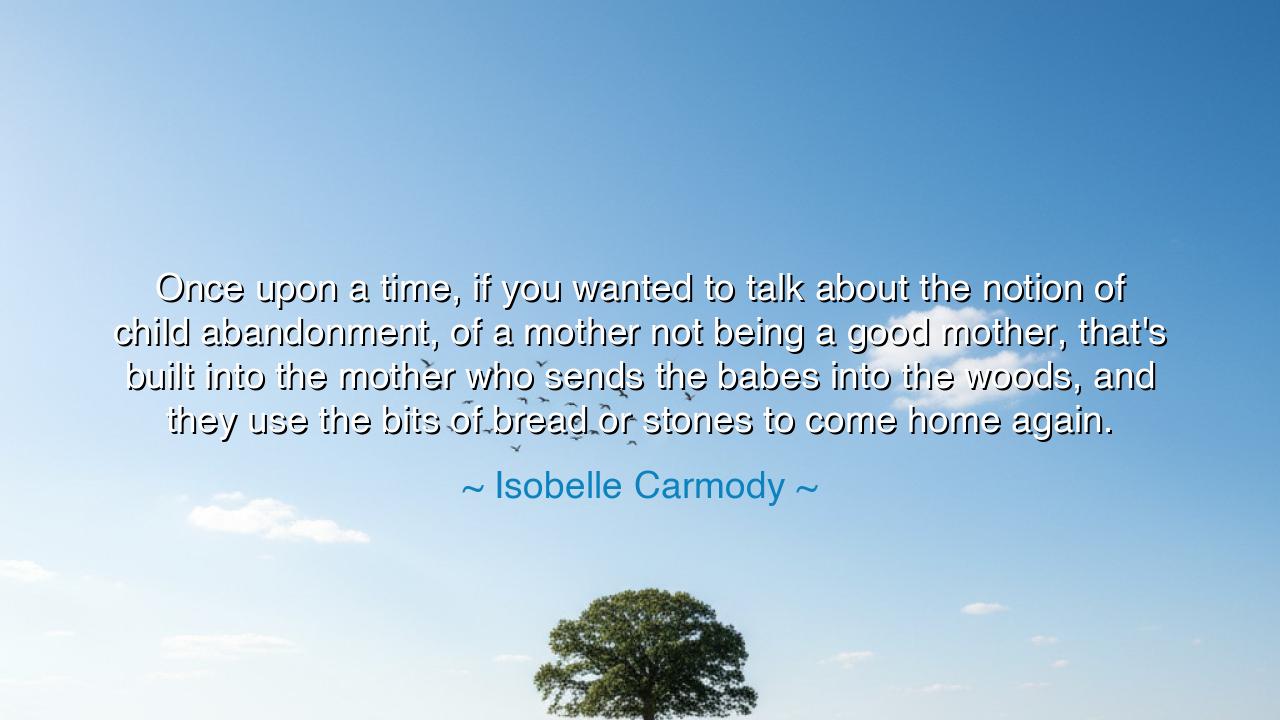
Once upon a time, if you wanted to talk about the notion of child
Once upon a time, if you wanted to talk about the notion of child abandonment, of a mother not being a good mother, that's built into the mother who sends the babes into the woods, and they use the bits of bread or stones to come home again.






In the twilight grammar of stories, a voice reminds us that old tales carry hard truths: “Once upon a time, if you wanted to talk about the notion of child abandonment, of a mother not being a good mother, that’s built into the mother who sends the babes into the woods, and they use the bits of bread or stones to come home again.” So speaks Isobelle Carmody, pointing us toward the deep well of folklore where private griefs take public shape. The meaning is clear: when a culture could not say aloud what it feared—neglect, hunger, betrayal—it set the fear into a fable and let the forest hold the echo.
In this telling, the mother is not only a woman; she is an archetype—the first shelter, and, in dark hours, the first exile. The woods are the edge of the map where society’s certainties end; to be sent there is to feel the door of belonging close behind you. Yet the story gives the children cunning: crumbs of bread that fail, pebbled stones that endure. We learn that memory and craft—how to mark a path, how to read the moon—are young hands’ answer to abandonment. The breadcrumb trail is hope that crumbles; the stone trail is wisdom that lasts.
The origin of this motif is not only imaginative; it is historical. In lean centuries of famine and war, when households cracked under scarcity, many children were given up to convents, foundling homes, or, in the cruelest cases, left to the mercy of crossroads and strangers. Communities could not bear to confess this pain directly, so they spoke through fairy tale law. A bad harvest became a witch’s hunger; parental despair became the mother (or stepmother) who “cannot keep two extra mouths.” By lodging the unthinkable in the forest, the tale preserved the truth without naming names.
Consider a true counter-song from history to sharpen the lesson. In Renaissance Florence stood the Ospedale degli Innocenti, a place with a turning “foundling wheel” where desperate parents left infants into anonymous care. There, abandonment was transmuted into rescue: wet nurses were hired, ledgers kept, small tokens pinned to tiny cloaks so that, one day, a family might reclaim a child. The city—like the old stories—admitted both shadows: that some mothers could not keep their babes, and that society owed those babes a road home. The hospital became the city’s way of laying stones where bread would fail.
Carmody’s insight also warns the present. Our forests have changed: screens instead of thickets, streets instead of bracken. Yet the pattern persists whenever a child is exiled by addiction, neglect, or the quiet absence of attention. New breadcrumb trails—messages unsent, promises broken—still dissolve; new stone trails—mentors, shelters, laws that protect—still guide small feet back. The tale endures not because we relish sorrow, but because we must remember the map out of it.
What, then, is the charge to those who hear? First, do not dismiss fairy tales as whimsy; they are moral cartography. Second, when you see a child wandering the figurative woods, be the stone-layer: leave markers of safety—consistent presence, predictable rules, patient listening. Third, do not varnish harm with silence. Speak plainly about child abandonment in its modern forms—food insecurity, medical neglect, emotional desertion—so that policy and neighbor-love can meet it head-on.
Take these actions as provisions for the road. (1) Keep a stone trail in your community: know the numbers and names—hotlines, shelters, schools, clinics—so help is immediate, not theoretical. (2) Practice storytelling at home: read the old tales and ask the hard questions they raise; let children learn that evil can be outwitted and that courage is teachable. (3) Build “homes within homes”—corners of ritual and reliability—so that even when money thins, belonging does not. (4) When you must confront failure—your own or another’s—exchange bread for stones: trade empty assurances for durable deeds. Do these, and the forest will not vanish, but its paths will brighten; the mother may falter, yet the village will widen; and the children, taught to read the moon and the markers, will find their way home again.






AAdministratorAdministrator
Welcome, honored guests. Please leave a comment, we will respond soon